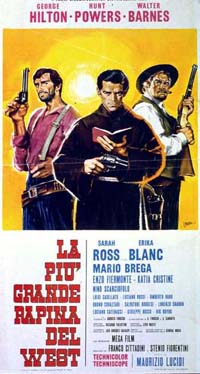aka La più grande rapina del West (It), Trois salopards… une poignée d’or (Fr), Ein Halleluja für Django (WG), Hallelujah for Django (US, unconfirmed)
1968
Italy
Franco Cittadini and Stenio Fiorentini for Mega Film (Rome)
Director: Maurizio Lucidi
Script: Augusto Finocchi, Augusto Caminito
Music: Luis Bacalov
Cinematography: Riccardo Pallotini {Technicolor – Techniscope}
Editor: Renzo Lucidi
Set design: Giancarlo Bartolini Salimbeni
Cameraman: Sergio Martinelli
Filmed: Cinecittà and S.C.O. (Rome)
Release information: Registered 26.10.67. Italy (28.10.67, 115 mins), France (02.09.70, 100 mins), West Germany (06.03.70, 115 mins)
Cast: George Hilton (Billy Rum), Hunt Powers (Il Santo), Walter Barnes (Jarret), Erika Blanc (Jenny), Mario Brega (Yanaro), Luigi Casellato (the barman), Tom Felleghy (Sheriff Norman), Enzo Fiermonte (Sheriff Martin), Sarah Ross, Glen Fortel, Katia Christine, Jeff Cameron [Geoffredo Scarciofolo], Sal Borgese, Rick Boyd [Federico Boido], Marisa Quattrini, Bruno Corazzari, Umberto Raho, Luciano Rossi (the telegraph operator), Luciano Catanecci, Mauro Bosco, Lorenzo Sharon, Cesare Martignoni, Lucia Righi, Valentino Macchi, Luigi Barbacone, Paolo Magalotti, Luciano Bonnani, Bill Vanders, Desiderio Raffaele, Roberto Alessandro, Stefano Alessandri.

This is an above average Spaghetti Western in which a band of crooks steal a fortune in gold from the bank and hide it in the handy-dandy statue of a local saint. One of their number, Santo (Hunt Powers), then takes it to an isolated small-town where they can meet up later and divide the loot. Inevitably enough, just about all of these desperadoes are determined to double cross each other. Matters aren’t helped by the fact that their leader Jarrett (Walter Barnes) is a ruthless butcher. As soon as he arrives he manages to lay siege to the town and shoot the Sheriff, thus raising the ire of Billy Rum (George Hilton), the dead man’s brother. Billy Rum, however, is a drunken brawler who happens to be locked up in the local jail at the time, so nobody pays much attention to him. Not too smart, for he is such an unremitting jailbird that he happens to have his own escape hatch, and from there he orchestrates the destruction of his foes with the help of some unexpected allies.
There’s a strange dichotomy of moods here that surfaces in several Hilton films (One More in Hell (Uno di piu all’inferno, 69), for instance, a film with which it bears some uncanny similarities). At first the ambiance is light, with a protracted punch up and the well handled titular crime. With the meat of the plot there then develops a darker, macabre sensibility which finally reverts to its former self with some nicely done final scenes. It’s as though Leone-ish Gothicism is battling with the rumbustuousness that seeped through Italian popular cinema from the 1950’s comedies and peplums onwards.
Maurizio Lucidi was a decent director who went on to make My Name is Pecos (Due once di piombo, 66) and Pecos Cleans Up (Pecos è qui, prega o muori, 67), two slices of western adventure that are fun and flippant in equal measures. He is helped here by Aldo Lado, later to make the superb Who Saw Her Die (Chi l’ha vista morire, 72) and Short Night of the Glass Dolls (Malastrana, 71). Luis Bacalov contributes a score that gets good when it stops being jaunty and Riccardo Pallottini’s camerawork is as great as ever.
There’s also a great collection of odd features and weird thesping on screen, with virtually every aesthetically challenged character actor to have appeared in these films cropping up at one point or another. When Luciano Rossi, one of the scuzziest looking individuals on celluloid can say “You know, whoever they are I don’t much like their looks…” and have a point, you know you’ve hit the jackpot.